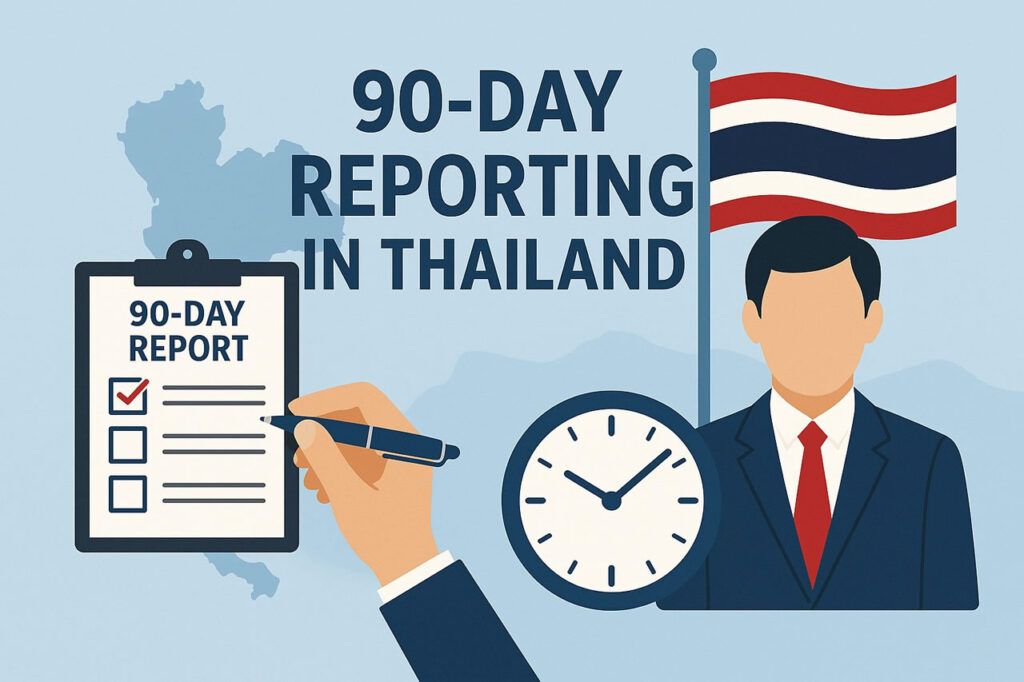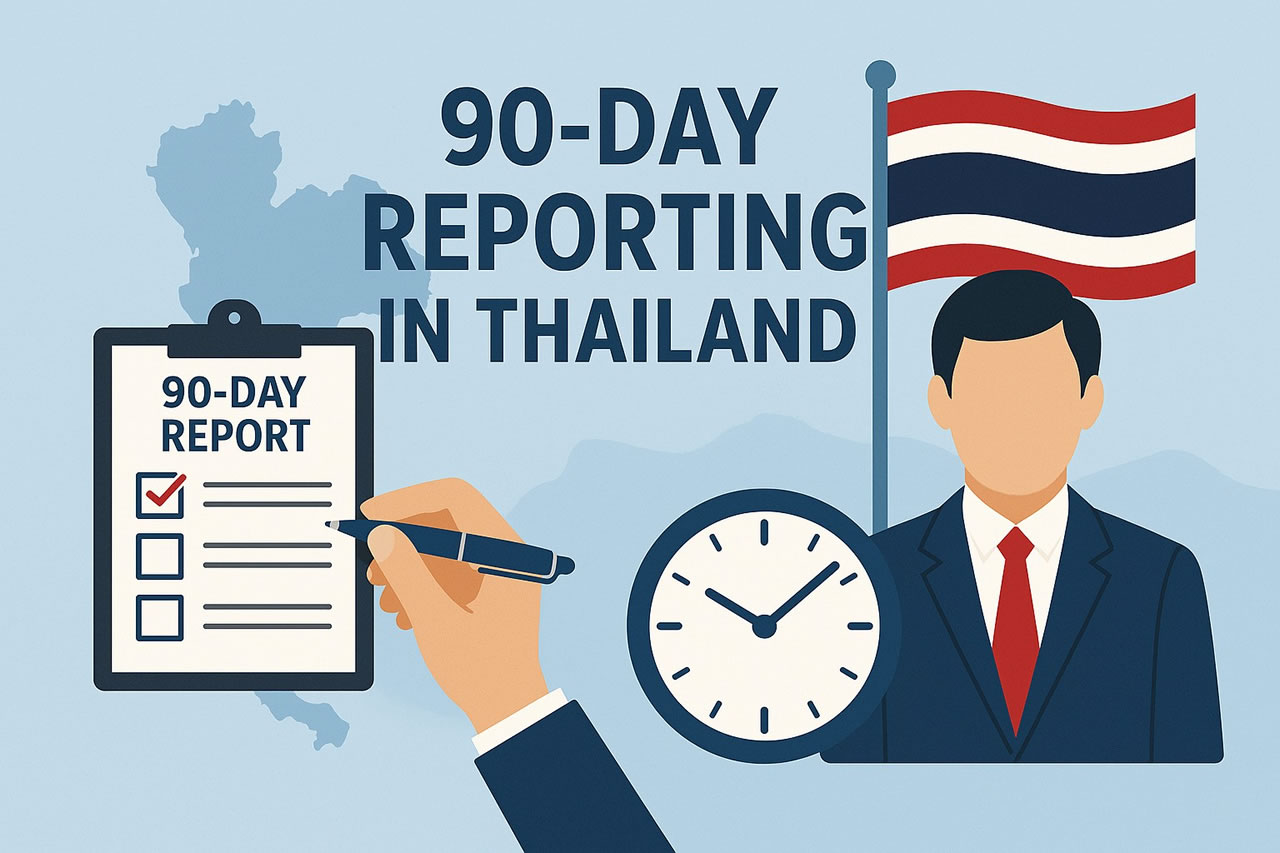
What is 90-Day Reporting?
If you’re a foreigner staying in Thailand for an extended period, you’ll need to be familiar with 90-day reporting. Officially known as “Notification of Staying in the Kingdom Over 90 Days,” this requirement applies to long-term visa holders, including those with Business, Education, Retirement, Elite, and other extended stay visas.
The process ensures that Thai authorities have up-to-date records of foreign residents, and it’s mandatory for anyone staying in Thailand for longer than 90 consecutive days. Once you’ve completed your first report, you’ll need to submit subsequent reports every 90 days for as long as you remain in the country.
Purpose of 90-Day Reporting
While 90-day reporting may seem like an inconvenience, it serves an important function in Thailand’s immigration system:
- It helps authorities track foreign nationals and monitor their locations.
- It assists in preventing illegal activities and staying aware of who is residing in the country long term.
- Some believe the system is outdated and primarily functions as a revenue-generating process, but as of now, it remains a necessary obligation for long-stay foreigners.
Reporting Frequency & Rules
The rules regarding 90-day reporting are straightforward but must be followed carefully to avoid penalties:
- You must report every 90 days of continuous stay in Thailand.
- If you leave the country before your 90-day deadline, the count resets upon re-entry, and a new 90-day period begins.
- Reports can be submitted up to 15 days before the deadline or up to 7 days after without a fine.
Need to update your address first? Learn how to submit your TM30 and stay compliant ===> TM30 in Thailand: What Expats and Landlords Need to Know
Penalties for Late Reporting
Failing to submit a 90-day report on time can lead to financial penalties:
- A 2,000 THB fine for late reporting if done voluntarily.
- A 5,000 THB fine if you are caught by immigration authorities before you report, plus 200 THB per day from the overdue date until you report.
Ways to Submit a 90-Day Report
There are several ways to submit your 90-day report, each with its advantages and limitations.
1. In-Person at an Immigration Office
This is the most commonly used method and provides immediate confirmation of compliance. However, it can be time-consuming, especially in major cities like Bangkok and Chiang Mai, where immigration offices are often crowded.
Required Documents:
- Passport (original and copies of the info page, visa page, latest entry stamp, and latest visa extension).
- TM47 Notification Form (completed and signed).
- TM6 Departure Card (if applicable).
- Copy of the previous 90-day slip (if available).
2. Online Submission
Thailand offers an online system for 90-day reporting, but there are restrictions:
- Only available for follow-up reports—the first report or any report after a passport renewal must be done in person.
- You must register with Thai Immigration Online Services before submitting online.
- Reports can be submitted 15 days before the due date and take up to 3 days to process.
- If your online report is rejected, you must report in person before your deadline.
- Go to: https://tm30.immigration.go.th
Downsides: The portal is known to be glitchy, slow, or randomly inaccessible. If you’re lucky, it works fine.
3. By Registered Mail
If visiting an immigration office isn’t convenient, you can submit your report by mail. However, this method requires planning to ensure it reaches immigration on time.
Instructions:
- Send documents at least 15 days before the deadline.
- Use registered mail to ensure proof of delivery.
Required Documents:
- Signed photocopies of passport pages (info page, visa, entry stamp, latest extension).
- TM47 Notification Form (completed and signed).
- Copy of TM6 Departure Card (if applicable).
- Copy of previous 90-day slip (if available).
- A self-addressed, stamped envelope (minimum 10 THB) for return confirmation.
Mail to:
90 Days Report Section, Immigration Division 1, Immigration Bureau
Chalermprakiat Government Complex (B Building)
120 Moo 3, Chaengwattana Road, Soi 7
Toongsonghong Sub-district, Laksi District, Bangkok 10210
How to Avoid 90-Day Reporting?
While 90-day reporting is mandatory for most long-stay visa holders, there are a few ways to avoid it:
- Leaving Thailand before your report is due resets the 90-day count, meaning you won’t need to report if you re-enter on a new 90-day cycle.
- Elite Visa holders often receive assistance with 90-day reporting as part of their VIP service, making the process easier.
While 90-day reporting may feel like an administrative burden, it is a mandatory requirement for long-term foreign residents in Thailand. With proper preparation, it can be managed efficiently.
To avoid fines and last-minute hassles:
- Plan ahead and mark your reporting dates on a calendar.
- Choose the most convenient submission method—whether in-person, online, or by mail.
- Ensure all documents are in order before submitting.
📌 By following these guidelines, you can stay compliant with Thai immigration rules and avoid unnecessary complications during your stay in the Land of Smiles.
| 📌 Looking for more visa help? |
|---|
| ✅ Thailand Visa Hub – Your central guide to all visa types, rules, and long-term options. |
| ✅ Visa Finder Tool – Answer a few quick questions and see which visa best fits your situation. |
| ✅ Visa Stay Calculator – Check expiry dates, 90-day reports, and plan visa runs with ease. |

